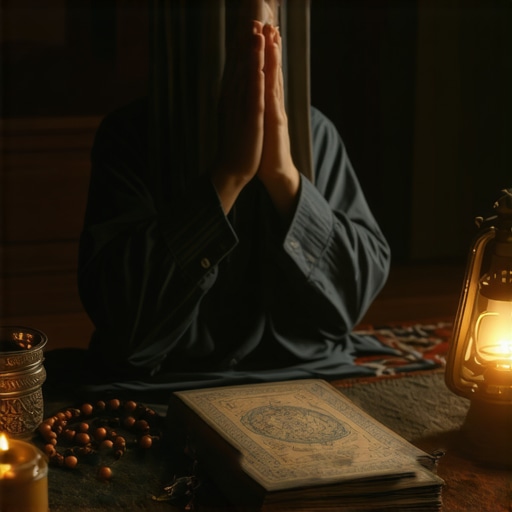My Personal Journey to Overcome Bad Dreams Through Islamic Sacred Practices
Honestly, I used to dread bedtime because of the unsettling dreams that would often disturb my peace. It felt like an invisible weight pressing down on my spirit, making me anxious even before I closed my eyes. But everything changed when I started exploring Islamic methods for spiritual protection, rooted in faith and tradition. I want to share some of these sacred steps that helped me find relief and a renewed sense of safety from bad dreams.
The Power of Quranic Verses and Duas for Dream Protection
One of the first things I did was recite specific Quranic verses before sleeping. Surah Al-Falaq and Surah An-Nas are known for their protective qualities against evil whispers and harmful spirits. I also found comfort in Ayat Al-Kursi, which is often called the throne verse, believed to offer divine protection. Incorporating these recitations into my nightly routine created a shield around my sleep, making my dreams more peaceful. For a deeper understanding, I studied understanding dreams in Islam and how sacred texts influence dream symbolism.
Seeking Divine Help Through Prayer and Wudhu
Another step I took was performing Wudhu, the ritual purification, which is said to cleanse the soul and ward off negative energies. After Wudhu, I would pray the Dua for protection, asking Allah to keep me safe from nightmares and evil influences. This act of devotion not only strengthened my trust in divine power but also brought a calming effect that often carried into my dreams. I found that these spiritual acts are supported by Islamic teachings on spiritual purity and divine guidance, like those explained in Ibn Al-Qayyim’s insights on dreams.
What Is the Deeper Meaning Behind Bad Dreams in Islam?
Some nights, I still experienced disturbing dreams, which made me wonder about their true meaning. Islamic tradition suggests that bad dreams can be a test or a warning from Allah, or even a manifestation of Shaytan trying to mislead us. Understanding this helped me approach my dreams with patience and trust in divine wisdom. I learned that not all dreams are negative; some are signs of spiritual growth or divine messages, as discussed in dream interpretations about losing teeth.
How Can I Strengthen My Spiritual Defenses Against Bad Dreams?
To ensure continuous protection, I make it a point to keep my heart and mind focused on good deeds and remembrance of Allah. Reciting Dhikr, especially in the evening, helps maintain a spiritual shield. Sharing my experiences with fellow believers and seeking advice from knowledgeable scholars has also been invaluable. I encourage you to explore these practices and see how they can bring tranquility to your nights. Feel free to share your own journey or ask questions in the comments below!
Remember, divine guidance is always accessible, and through sincere faith and consistent practice, we can find peace even in our dreams. For further reading, I recommend visiting the comprehensive guide to Islamic dream symbols.
Unlocking the Spiritual Power: How Islamic Rituals Shield You from Bad Dreams
Many believers seek divine protection to ward off unsettling dreams, and Islamic traditions offer profound practices rooted in faith. Reciting specific Quranic verses such as Tafsir Al-Ahlam provides spiritual fortification. These verses serve as divine shields, transforming our sleep into a sanctuary of peace. Incorporating these recitations before bedtime is a simple yet powerful act that aligns your heart with divine protection.
The Ritual of Wudhu: A Sacred Step Toward Inner Calm
Performing Wudhu is more than physical purification; it’s a spiritual cleansing that clears away negative energies and prepares the soul for divine connection. After Wudhu, many Muslims turn to dua—supplications for protection. For example, reciting Ibn Al-Qayyim’s insights emphasize the importance of sincere prayer in shaping our dream experiences. These acts of devotion foster a sense of divine companionship, soothing the mind before sleep.
Deciphering the Hidden Meanings of Nightmares in Islamic Context
Islamic scholars teach that not all disturbing dreams are mere illusions; some carry divine messages or serve as tests from Allah. Recognizing the difference is crucial in maintaining spiritual resilience. For example, dreams involving snakes or falling might symbolize warnings or spiritual obstacles, as explored in dreams about snakes. Understanding these symbols requires study and reflection, often guided by authentic sources like dream interpretation guides.
What Are the Practical Steps to Deepen My Spiritual Defenses Against Nightmares?
Beyond recitation and Wudhu, cultivating a heart filled with gratitude and mindfulness enhances your spiritual defenses. Regular Dhikr (remembrance of Allah), especially in the evening, acts as a divine shield, fortifying your soul against Shaytan’s whispers. Engaging with knowledgeable scholars or joining community circles can deepen your understanding and provide support. For further insights, exploring the sacred symbolism behind dreams can reveal divine messages—like the significance of green in dreams—which often symbolizes spiritual growth and divine mercy.
Share your experiences or ask questions below; your journey toward peaceful sleep is a valuable part of your spiritual path. Remember, divine protection is always within reach through sincere faith and consistent practice.
For a comprehensive understanding of dream symbols and their meanings, I highly recommend reading Tafsir Al-Ahlam.
Beyond the Basics: Embracing the Nuances of Islamic Dream Protection
As I delved deeper into my journey of spiritual safeguarding, I realized that protecting oneself from bad dreams isn’t merely about reciting verses or performing rituals. It requires a profound understanding of the subtle energies and spiritual states that influence dreams. For instance, Ibn Al-Qayyim emphasizes that a pure heart, filled with sincere Dhikr, acts as a potent shield against Shaytan’s whispers, especially during vulnerable sleep states. This insight prompted me to integrate mindfulness and inner purification into my nightly routine, transforming simple acts into holistic spiritual practices.
How Do Inner States and Spiritual Purity Influence Dream Experiences?
One of the most intriguing aspects I discovered is that the quality of one’s inner spiritual state directly impacts the nature of dreams. According to Islamic teachings, sins and negative emotions can create openings through which Shaytan or negative energies influence our subconscious. I found that regular repentance, heartfelt supplication, and sincere remorse for past misdeeds can elevate one’s spiritual defenses, making the environment of sleep more divine and less susceptible to disturbances. This realization led me to view nightly protection not just as a ritual but as a reflection of ongoing spiritual self-improvement.
Can Advanced Recitations or Occulted Verses Offer Deeper Protection?
While Surah Al-Falaq, Surah An-Nas, and Ayat Al-Kursi are well-known, I also explored the significance of reciting lesser-known but powerful duas from authentic Islamic sources. For example, some scholars recommend specific prayers from the Prophet’s traditions that are less commonly recited but carry profound protective blessings. These include supplications that invoke Allah’s names and attributes, emphasizing the divine mercy and omnipotence that shield us from unseen harms. Incorporating these into my routine created a layered spiritual barrier, much like a fortress built on faith and divine trust.
How Does Personal Reflection and Dream Analysis Enhance Our Spiritual Resilience?
Another layer I integrated was reflective journaling—writing down dreams and contemplating their symbols with the help of Islamic dream dictionaries. This practice is supported by Islamic scholars like Al-Nabulsi, who reveal that understanding dream symbols—such as snakes, falling, or dark figures—can provide insights into one’s spiritual state and areas needing attention. By recognizing recurring themes and seeking their divine messages, I found myself becoming more attuned to my inner self and more resilient against negative influences. This ongoing process of self-awareness fosters a deep connection with Allah’s guidance and helps us interpret dreams as sacred messages rather than mere illusions.
What Are the Practical Steps to Cultivate Sacred Vigilance and Inner Peace?
To deepen my spiritual defenses, I adopted a routine of nightly Dhikr, focusing on divine names associated with protection, such as Al-Hafiz (The Preserver) and Al-Mujib (The Responsive). Practicing sincere gratitude and mindfulness before sleep elevates the soul’s vibration, making it less vulnerable to Shaytan’s whispers. Additionally, seeking knowledge through trusted scholars and engaging in community discussions about dreams and spiritual practices strengthens one’s understanding and resilience. I invite you to share your experiences or questions—your journey is uniquely valuable and can inspire others on their path.
Remember, the divine protection Allah grants is always accessible through heartfelt faith and consistent effort. Exploring sacred texts and advanced spiritual techniques can unlock deeper layers of tranquility and safety during sleep. For further insights, I recommend exploring the comprehensive guide to Islamic dream symbols.
Harnessing the Power of Intentional Supplication and Sacred Symbols
As I advanced in my journey of spiritual protection, I discovered that the key lies in cultivating a conscious and intentional approach to supplication. Beyond reciting verses like Ibn Al-Qayyim’s insights, I began to incorporate specific duas that invoke Allah’s divine names in a targeted manner. For instance, supplications that call upon Al-Hafiz (The Preserver) reinforce divine guardianship over one’s sleep. These acts of mindful invocation serve as potent spiritual tools, transforming passive recitations into active shields against Shaytan’s whispers.
Deciphering Sacred Dream Symbols Through Scholarly Exegesis
Intimate knowledge of Islamic dream symbolism significantly enhances our ability to interpret and respond to nocturnal visions. I delved into classical works like the Tafsir Al-Ahlam, which offers profound insights into the spiritual meanings behind common symbols. Recognizing patterns—such as the appearance of water, snakes, or celestial objects—requires not only familiarity with these texts but also personal reflection on one’s inner state. This layered understanding allows us to differentiate between divine messages and Shaytan’s deceptions, ultimately strengthening our spiritual resilience.
Integrating Inner Purity and Continuous Self-Reflection
My most transformative realization was the influence of inner purity on dream experiences. Regular acts of tawbah (repentance) and heartfelt sincere repentance elevate the spiritual environment, rendering it more receptive to divine guidance and less vulnerable to negative influences. I adopted nightly practices of heartfelt supplication and gratitude, which not only cultivated inner peace but also fortified my spiritual defenses. This holistic approach aligns with the teachings of scholars like Al-Nabulsi, emphasizing that authentic spiritual protection stems from the purity of the heart and unwavering faith.
Can Advanced Rituals and Esoteric Practices Enhance Dream Protection?
While mainstream recitations and Wudhu lay a strong foundation, I explored lesser-known but powerful duas from authentic prophetic traditions. These include invoking Allah’s divine attributes with specific prayers that emphasize mercy, protection, and omnipotence. Such practices create a layered fortress—akin to a spiritual armor—that shields the believer from unseen harms. Incorporating these advanced supplications into your nightly routine can deepen your spiritual resilience and foster a stronger connection with divine mercy.
Engaging in Sacred Reflection and Dream Journaling for Inner Growth
To further enhance my spiritual defenses, I adopted the practice of reflective journaling—writing down dreams and contemplating their symbolism through the lens of Islamic exegesis. Consulting authoritative sources like Ibn Sirin’s dream dictionary provided clarity on recurring themes, enabling me to interpret divine messages accurately. This ongoing process of self-awareness and divine communication fosters a resilient spiritual state, transforming dreams into sacred messages and opportunities for growth.
How Can I Cultivate Sacred Vigilance in My Daily Routine?
Deepening my spiritual protection involved establishing a mindful routine of nightly Dhikr, focusing on divine names associated with protection such as Al-Hafiz and Al-Mujib. Practicing sincere gratitude and mindfulness before sleep elevates one’s spiritual vibration, making it less susceptible to Shaytan’s whispers. Engaging with knowledgeable scholars or participating in community circles about dreams and spiritual practices further enriches understanding. I invite you to explore these advanced techniques and share your experiences—your journey can inspire others seeking divine safety and tranquility in their sleep.
Remember, the divine safeguard is always accessible through sincere faith and consistent effort. Unlocking deeper layers of tranquility during sleep requires both knowledge and heartfelt devotion. For further insights, I recommend exploring the comprehensive guide to Islamic dream symbols.
Things I Wish I Knew Earlier (or You Might Find Surprising)
1. The Power of Intention in Supplication
One thing I overlooked for a long time was how much the sincerity behind my duas affected their effectiveness. When I started praying with genuine focus and heartfelt trust, I noticed a real shift in the tranquility I felt before sleeping, which also reflected in my dreams.
2. Inner Purity as a Spiritual Shield
I used to think rituals alone would suffice, but I realized that cultivating inner purity through repentance and mindfulness truly strengthens our defenses against negative dreams and Shaytan’s whispers. This holistic approach made my nights more peaceful.
3. The Subtle Power of Dream Symbols
Understanding the deeper meanings of common dream symbols like water, snakes, or darkness — through trusted Islamic sources — helped me interpret dreams correctly and avoid unnecessary fear, turning dreams into messages rather than mere illusions.
4. Consistency Over Time Matters
My protection against bad dreams improved significantly when I committed to consistent practices like reciting Quranic verses and Dhikr every night. Small daily acts build a strong spiritual fortress over time.
5. The Role of Heartset and Mindset
One surprising insight was how my emotional state and thoughts during the day influenced my dreams. Keeping a positive, grateful mindset created a more peaceful sleep environment, reducing nightmares.
6. Sacred Rituals Are Multi-Dimensional
Beyond recitations, performing Wudhu and engaging in sincere supplication act as both physical and spiritual acts that set the tone for restful, protected sleep, aligning with Islamic teachings on spiritual cleanliness.
Resources I’ve Come to Trust Over Time
- Quran and Sunnah: The foundational sources for all spiritual practices, offering divine guidance that I constantly turn to for protection and understanding.
- Ibn Al-Qayyim’s Works: His insights on dreams and spiritual purification have deepened my understanding of the unseen and the importance of inner cleanliness.
- Islamic Dream Interpretation Books: Such as the comprehensive guides like Tafsir Al-Ahlam, which helped me decode symbols and messages in dreams accurately.
- Trusted Scholars and Community: Engaging with knowledgeable teachers and fellow believers has enriched my spiritual journey and provided practical advice.
Parting Thoughts from My Perspective
Looking back, I realize that protecting myself from bad dreams in Islam is a journey that involves both rituals and internal spiritual work. The most valuable lesson I learned is that sincere faith, combined with consistent practice of Quran recitation, prayer, and inner purification, creates a powerful shield that can bring peace even in sleep. If this resonates with you, I’d love to hear your own experiences or insights. Remember, divine protection is always accessible through heartfelt devotion and ongoing self-improvement. Feel free to share this article with someone who might find it helpful or drop your thoughts in the comments — your story might inspire others on their spiritual path.



I found this post truly inspiring as it highlights the deep connection between faith and daily routines in seeking spiritual protection. In my own experience, combining Quranic recitations with sincere supplication has really helped me overcome nightmares and feel more secure during sleep. I especially resonated with the idea that inner purity and mindful remembrance of Allah serve as potent shields. It made me reflect on how cultivating a pure heart through consistent istighfar and gratitude can transform not just our dreams but our overall spiritual resilience. Has anyone here experienced a particular dua or practice that significantly shifted their sleep quality? I believe that understanding and applying these sacred practices can be a personalized journey, and sharing these insights could greatly benefit others struggling with troubling dreams.
Reading your journey truly resonated with me, especially the emphasis on spiritual sincerity and regular dhikr to fortify one’s defenses against negative dreams. I’ve also found that maintaining a peaceful state of mind during the day greatly influences the tranquility of sleep and dreams at night. In my experience, adding a short, heartfelt dua before sleeping—asking Allah for protection and peaceful dreams—can sometimes make a profound difference. I wonder, how do others manage to keep consistent routines when facing the busyness of daily life? I’ve noticed that even small, intentional acts—like reciting Ayat Al-Kursi or engaging in brief remembrance—can act as powerful shields if done with genuine mindfulness. It’s inspiring to see how these sacred practices can transform sleep into a restful, spiritually protected experience. Would love to hear more about others’ personal routines or tips that help maintain spiritual vigilance amidst hectic schedules!